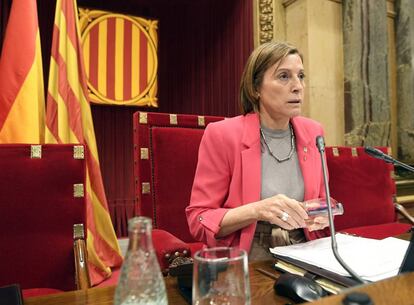The Catalan independence process runs aground
The authoritarian methods of the seccessionists disqualifies their project in the eyes of the world

Wednesday’s debate in the Catalan regional parliament that approved a law to hold an independence referendum on October 1, takes to breaking point an already tense situation created by the challenge that the independence process initiated five years ago represents for Spanish democracy, the law and Catalonia’s own institutions.
That independence process is now close to running aground. The secessionists were already deprived of allies; the moderate nationalists and those prepared to stick to the law have been expelled from their parties and the regional government; Catalan society has been divided, and having followed an arcane route map that has undermined politics, all that was left was the final flourish needed to begin the final chapter in this ludicrous escapade.
Unless it returns to the realms of legality, the Catalan question will drift further away from viable, constructive solutions
That flourish was the echo chamber of a social movement that had started out as responsive, approachable, civic-minded and peaceful: a kind of secessionist 15-M movement. The spectacle on Wednesday of a tiny pro-independence parliamentary majority (representative of a minority of voters), along with that of the institution’s speaker, Carme Forcadell, was a shameful attempt to quash any opposition, along with the millions of voters they represent, and thus the democracy and legal system combined. In short, it was the very opposite of the transparency and legality that had been promised.
The first major step in breaking away from Spain took place in parliament. Agreed. But it was a stormy session, as might have been expected from a movement that aims to destroy the gains built jointly over four decades of Spanish democracy, namely Catalan autonomy and the contribution of Catalans to the collective knowhow, as well as to Europe.
The attempt to pressure opposition deputies and to divide the regional parliament in two (and thus to split Catalonia itself) prompted a dignified response by the minority parties. We witnessed authoritarian, aggressive and uncivil behavior by the pro-independence parties and the speaker of the parliament toward the representatives of more than half the electorate.
This simplified, opaque and hasty procedure, absent of any legal guarantees and against the Constitution, leaving no time for debate or amendment, was patent for all to see: a clear demonstration of the Herculean task of breaching co-existence and legality through a virtually clandestine law, deprived of any parliamentary credibility and failing to meet the most basic democratic standards.
All that was left was the final flourish needed to begin the final chapter in this ludicrous escapade
Some of the more aware deputies belonging to the secessionist block realized that the sectarian nature of this law, along with the servile and authoritarian approach of the speaker of the Catalan regional parliament was endangering their project not just in the eyes of voters watching the debate on television, but in those of the international community. It is with sadness, doubtless shared by many, that an institution that has been a pioneer in so many positive ways should have been subjected to such harm.
That said, there are other cases of parliaments inflicting harm on themselves (sometimes even committing suicide) by handing over their power to out-of-control governments, dangerous leaders or by approving ridiculous projects.
The parliamentary bureau’s veto of a request by the Council of Statutory Guarantees for a ruling of the constitutionality of the proceedings was a flagrant breach of the rights of democratic representatives and an attack against Catalonia’s statute, as was its decision that the majority of seats prevailed over all others (such as those dedicated to its oversight), raising the specter of dictatorship. These are people who reduce popular sovereignty to parliamentary hegemony, and then shrink it further to a circumstantial majority.
That veto was a powerful blow to the parliament, with the concomitant damage to its credibility. From now on, its laws, lacking any filters to protect them, and out of sync with the necessary legal structures, will coexist alongside the parliament’s correct procedures, but as everybody knows, forgeries tend to force the real McCoy out of the marketplace. The loser in all this is Catalonia, and above all, Catalans.
The plans of the secessionists have already split Catalan society, but their immediate goals have gone further: to breach the collaboration and solidarity of Spaniards and the plural and decentralized state they have been given. The government’s decision to restore legality by appealing to the Constitutional Court is the right one. It is particularly commendable that the main opposition parties, despite their differences with the government, have thrown their support behind this decision.
Unless it returns to the realms of legality, the Catalan question will drift further away from viable, constructive solutions that avoid division, and hopefully, frustration and pain.
English version by Nick Lyne.
Tu suscripción se está usando en otro dispositivo
¿Quieres añadir otro usuario a tu suscripción?
Si continúas leyendo en este dispositivo, no se podrá leer en el otro.
FlechaTu suscripción se está usando en otro dispositivo y solo puedes acceder a EL PAÍS desde un dispositivo a la vez.
Si quieres compartir tu cuenta, cambia tu suscripción a la modalidad Premium, así podrás añadir otro usuario. Cada uno accederá con su propia cuenta de email, lo que os permitirá personalizar vuestra experiencia en EL PAÍS.
¿Tienes una suscripción de empresa? Accede aquí para contratar más cuentas.
En el caso de no saber quién está usando tu cuenta, te recomendamos cambiar tu contraseña aquí.
Si decides continuar compartiendo tu cuenta, este mensaje se mostrará en tu dispositivo y en el de la otra persona que está usando tu cuenta de forma indefinida, afectando a tu experiencia de lectura. Puedes consultar aquí los términos y condiciones de la suscripción digital.








































